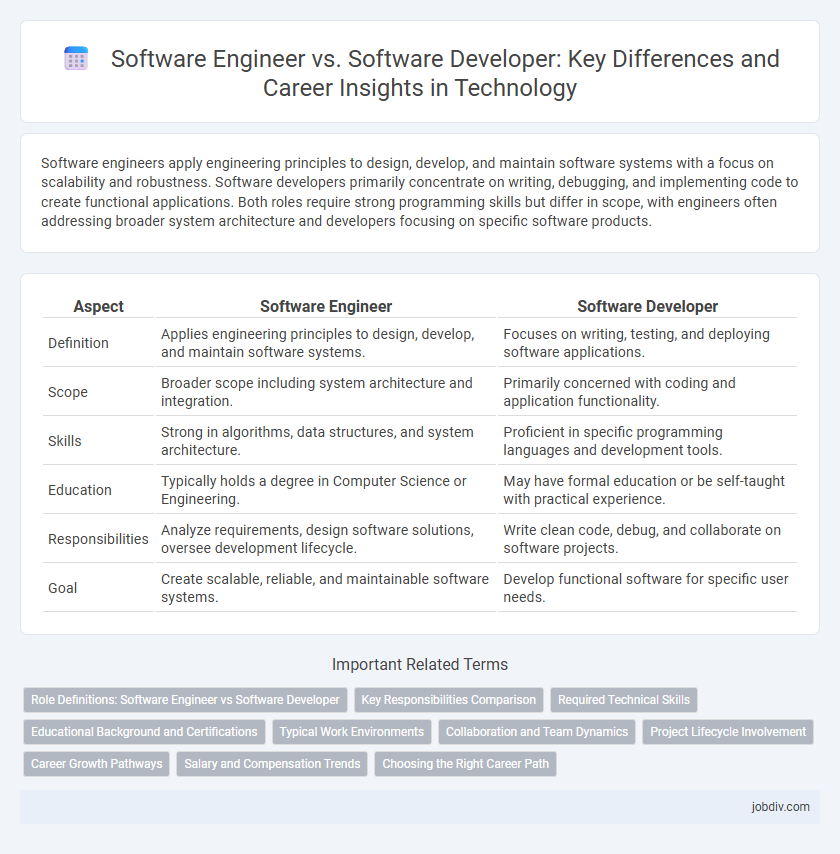Software engineers apply engineering principles to design, develop, and maintain software systems with a focus on scalability and robustness. Software developers primarily concentrate on writing, debugging, and implementing code to create functional applications. Both roles require strong programming skills but differ in scope, with engineers often addressing broader system architecture and developers focusing on specific software products.
Table of Comparison
| Aspect | Software Engineer | Software Developer |
|---|---|---|
| Definition | Applies engineering principles to design, develop, and maintain software systems. | Focuses on writing, testing, and deploying software applications. |
| Scope | Broader scope including system architecture and integration. | Primarily concerned with coding and application functionality. |
| Skills | Strong in algorithms, data structures, and system architecture. | Proficient in specific programming languages and development tools. |
| Education | Typically holds a degree in Computer Science or Engineering. | May have formal education or be self-taught with practical experience. |
| Responsibilities | Analyze requirements, design software solutions, oversee development lifecycle. | Write clean code, debug, and collaborate on software projects. |
| Goal | Create scalable, reliable, and maintainable software systems. | Develop functional software for specific user needs. |
Role Definitions: Software Engineer vs Software Developer
Software engineers apply engineering principles to design, develop, test, and maintain software systems with a focus on scalability, reliability, and long-term structural integrity. Software developers primarily concentrate on writing, debugging, and executing code to create functional applications tailored to specific user requirements. The distinction lies in software engineers addressing systemic architecture and integration challenges, while software developers focus on translating project specifications into operational software components.
Key Responsibilities Comparison
Software Engineers focus on applying engineering principles to design, develop, test, and maintain scalable software systems, emphasizing system architecture and code quality. Software Developers primarily concentrate on writing, debugging, and executing code to build functional software applications tailored to user requirements. Both roles collaborate closely, but engineers often address broader system-level challenges while developers focus on specific application functionality.
Required Technical Skills
Software engineers require a strong foundation in software architecture, system design, and algorithms, along with proficiency in multiple programming languages such as Java, Python, or C++. Software developers focus more on coding, debugging, and implementing specific features using languages like JavaScript, Ruby, or PHP. Both roles demand expertise in version control systems, understanding of APIs, and familiarity with development tools like Git, Docker, and continuous integration platforms.
Educational Background and Certifications
Software engineers typically possess a formal education in computer science or software engineering, often holding a bachelor's or master's degree, while software developers may enter the field with diverse educational backgrounds, including self-taught or bootcamp training. Certifications such as Certified Software Development Professional (CSDP) or Microsoft Certified: Azure Developer Associate are more commonly pursued by software engineers to demonstrate expertise in engineering principles and system design. Software developers might focus on certifications like AWS Certified Developer or Oracle Java Certification to validate their coding skills and application development knowledge.
Typical Work Environments
Software engineers typically work in structured environments such as technology companies, research labs, and large enterprises where they collaborate on system architecture and complex software solutions. Software developers often operate in dynamic settings like startups, agile teams, or freelance projects concentrating on coding, application development, and user interface design. Both roles require proficiency in programming languages and tools, but work environments can differ significantly in team size, project scope, and development methodologies.
Collaboration and Team Dynamics
Software engineers often engage in cross-functional collaboration, integrating system architecture with development teams to ensure cohesive project execution. Software developers primarily focus on coding and implementing features while coordinating with product managers and designers to align with user requirements. Both roles require strong communication skills to foster effective team dynamics and deliver high-quality software solutions.
Project Lifecycle Involvement
Software engineers typically engage in the entire project lifecycle, from initial requirements gathering, system architecture design, and development to testing and maintenance, ensuring a structured and scalable solution. Software developers focus more on the coding and implementation phases, translating designs into functional software while collaborating closely with engineers and stakeholders. This distinction emphasizes engineers' broader role in strategic planning and developers' specialization in building and refining software components.
Career Growth Pathways
Software Engineers typically follow a structured career growth pathway involving roles such as Systems Architect, Engineering Manager, and eventually Chief Technology Officer, emphasizing design, scalability, and system reliability. Software Developers often advance through roles like Lead Developer, Product Manager, and Senior Software Engineer, focusing on coding, application development, and product delivery. Both career paths demand continuous skill enhancement in programming languages, software development methodologies, and project management to achieve leadership positions in the tech industry.
Salary and Compensation Trends
Software engineers generally command higher salaries than software developers due to their broader scope in system design and architecture, with median annual earnings around $110,000 to $130,000 in the U.S. compensation trends reveal tech hubs like Silicon Valley and Seattle offer premium pay packages including stock options, bonuses, and benefits, driving average total compensation up to $150,000 or more. Industry demand for specialized skills such as cloud computing, AI, and cybersecurity heavily influences salary variations, making continuous skill development crucial for maximizing earning potential in both roles.
Choosing the Right Career Path
Choosing between a software engineer and a software developer career depends on individual goals and preferred scope of work. Software engineers typically focus on system architecture, design, and applying engineering principles to software creation, while software developers concentrate more on coding, debugging, and building specific applications. Understanding these role distinctions helps align career paths with desired technical skills, project involvement, and long-term growth opportunities in the technology sector.
Software Engineer vs Software Developer Infographic

 jobdiv.com
jobdiv.com